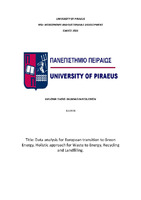Data analysis for European transition to green energy. Holistic approach for waste to energy, recycling and landfilling
Ανάλυση δεδομένων για την Ευρωπαϊκή μεταστροφή στη πράσινη ενέργεια. Ολιστική προσέγγιση για τους τομείς WtE, ανακύκλωσης και ταφής

Master Thesis
Συγγραφέας
Καζάνας, Παντελεήμων
Kazanas, Panteleimon
Ημερομηνία
2021Επιβλέπων
Πολέμης, ΜιχαήλΠροβολή/
Λέξεις κλειδιά
Waste to energy ; Finance sector ; Europe ; Panel dataΠερίληψη
Σε αυτή τη διπλωματική, έγιναν 3 διαφορετικές υποθέσεις για να εξεταστεί πώς οι οικονομικοί παράγοντες (ΑΕΠ και περιβαλλοντικοί φόροι) επηρεάζουν θετικά ή αρνητικά παράγοντες του τομέα της πράσινης ενέργειας όπως οι μέθοδοι επεξεργασίας αποβλήτων και οι εγκαταστάσεις WtE. Τα δεδομένα συλλέχθηκαν σε ετήσια βάση και καλύπτουν την περίοδο από το 2003 έως το 2019. Ο κύριος σκοπός είναι η διερεύνηση πιθανών συσχετίσεων μεταξύ αυτών των παραγόντων. Δεν υπάρχει καμία παρόμοια δημοσιευμένη αναφορά μέχρι τώρα. Η υπόθεση 1 χρησιμοποιεί ανάλυση Time Series και για 2,3 ανάλυση Data Panel. Τα στατιστικά μοντέλα για την υπόθεση 2 και 3 ήταν το Μοντέλο OLS και το Fixed effects OLS. Τα αποτελέσματα αποκαλύπτουν μερικά ενδιαφέροντα ευρήματα. Πρώτον, οι ανεπτυγμένες οικονομίες στην Ευρώπη δεν ακολουθούν μια ανοδική τάση μονάδων WtE σε αντίθεση με τις αναδυόμενες οικονομίες που επέλεξαν πολιτικές ταχείας ανάπτυξης της πράσινης ενέργειας με περισσότερα εργοστάσια WtE, ειδικά μετά την κρίση 2009-2010. Επίσης, η ανάλυση παρουσιάζει μια μικρή αρνητική συσχέτιση μεταξύ του GDP και των WtE εγκαταστάσεων που αποκαλύπτει μια αναντιστοιχία των 2 παραγόντων. Επιπλέον, η παραγωγή αποβλήτων είναι ένα ασταμάτητο αυξανόμενο πρόβλημα για τις περισσότερες χώρες, ενώ ταυτόχρονα η αποτέφρωση υποστηρίζει την αύξηση της παραγωγής αποβλήτων. Επίσης, οι πράσινοι φόροι έχουν αρνητική επίδραση στην ανακύκλωση. Το πιο ενδιαφέρον μέρος είναι η ελάχιστη ανάπτυξη των εργοστασίων WtE και των πράσινων φόρων στην Ευρώπη μετά το 2010. Ένας μετασχηματισμός πολιτικής είναι απαραίτητος εάν η ΕΕ θέλει να επιτύχει μετάβαση σε καθαρή ενέργεια. Η ανανεώσιμη ανοδική τάση δεν συσχετίστηκε με την επίπεδη τάση των εργοστασίων WtE που αποκαλύπτουν ότι η ανακύκλωση είναι η κυρίαρχη επεξεργασία αποβλήτων. Μετά το 2010, οι ευρωπαϊκές χώρες επικεντρώνονται στις ανανεώσιμες πηγές ενέργειας χωρίς να αυξάνουν τα εργοστάσια Wte, ιδίως οι ανεπτυγμένες οικονομίες. Στο τέλος, η αύξηση του ΑΕΠ εκφράζει υψηλότερο θετικό αντίκτυπο στα εργοστάσια Wte από την κατανάλωση ενέργειας από ανανεώσιμες πηγές, η οποία βασίζεται στη διαφορά μεταξύ των ανεπτυγμένων και των αναδυόμενων οικονομιών.


